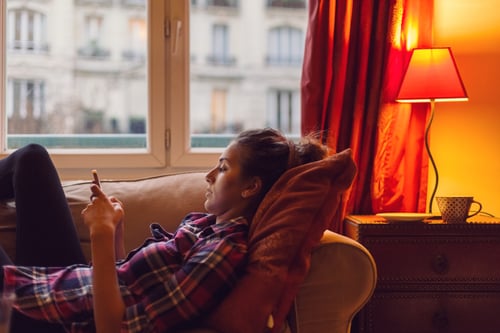How to avoid the traps that produce loneliness and isolation

Arthur C. Brooks
January 02, 2020
“Hell is other people,” wrote the French existentialist Jean-Paul Sartre in his 1944 play “No Exit.”
Sartre was wrong. Hell is the lack of other people, and according to the health-insurance company Cigna, loneliness and social isolation are rampant in the United States today. About half of Americans report sometimes or always feeling alone, Cigna found in a 2018 study of more than 20,000 U.S. adults. Barely more than half say they have meaningful daily in-person social interactions. Studies by the Kaiser Family Foundation and AARP have also reported widespread American loneliness.
You might ask why there is a sudden research interest in this topic. The answer: Researchers are discovering that loneliness harms both mental and physical health. But the real question is why so many people feel isolated, when contact with others should be easier than ever. If we can answer that, we can craft a solution — if not societally, at least personally, to make our lives happier and better.
One reason for isolation is shrinking social contact with people we don’t know. Not so long ago, strangers talked to each other a great deal in public — in buses, at the airport, in line at the bank. Why? Because there was not much else to do. The emergence of smartphone technology, promising to connect the world and end social isolation, has achieved the opposite result.
Why do we do block out other people this way? We may think it’s because our smartphones are irresistibly fascinating, but more likely we are simply seeking to ward off intrusion. The impulse stems from a mistaken belief that solitude is more pleasant than interacting with strangers, according to psychologists Nicholas Epley and Juliana Schroeder, writing in the Journal of Experimental Psychology in 2014.
New Year’s Resolution for an anxious world: Don’t dine alone
Follow Post Food Video Editor Mary Beth Albright’s New Year’s Resolution series to eat only when sitting down at a table with a human (The Washington Post)
Over the course of nine field and laboratory experiments, Epley and Schroeder asked Chicago-area commuters on trains and buses to predict the enjoyment of solitude vs. conversation with a stranger. Participants consistently said they preferred to be left alone but reported that when engaged by a stranger in conversation, they found the experience more pleasant than solitude.
In effect, we dive into our smartphones — the ultimate tools for ensuring solitude — out of a misplaced fear of the unknown, a mistake that increases our isolation and lowers our well-being.
A second reason for the uptick in social isolation is political polarization. When we politically curate our networks and friendships, most of us have fewer opportunities for new social interactions. If I am unwilling to interact with people who hold — or who might hold — the opposing viewpoint from mine, I have cut way back on the number of people with whom I might make a meaningful human connection.
It wasn’t so long ago that sorting friendships this way would have sounded as ridiculous as refusing to socialize with people who are shorter than average. When I was growing up in Seattle, my family’s neighborhood had a mix of Democrats and Republicans. (Yes, the Seattle Republican was once not an endangered species.) My parents held pretty strong political opinions, but I have no memory of their ever expressing a distaste for a neighbor on political grounds.
I suspect plenty of readers here would make similar reports about their childhoods — but would also insist that everything is different today, that Donald Trump (or Bernie Sanders, or Elizabeth Warren, or …) is so utterly beyond the pale that anyone who supports him (or her) is unworthy of attention, let alone friendship.
I don’t buy it. I think the real reason for our sociopolitical siloing is, once again, fear. Not fear of physical injury but fear that the other person’s views will be too unpleasant to bear.
Why do I believe this? My Harvard colleagues Charles A. Dorison, Julia A. Minson and Todd Rogers published a study last year in the journal Cognition that asked Clinton voters to estimate how unpleasant it would be to do things such as listen to President Trump’s 2017 inaugural address or read an article about why Trump voters continue to support him. Participants consistently predicted that the experience would be extremely unpleasant. But the researchers found that these forecasts tended to be unrealistically alarmist: The expected degree of unpleasantness, vs. the actual experience, was overstated by between a quarter and a third. It turns out that hearing the views of your political foe might not be such a big deal.
How can we use this information? Personally, I’m taking two positive steps, and I recommend them to you. Call them New Year’s resolutions if you like.
First, each day, make a point of putting down your smartphone and talking to a stranger. Take note of something you learn from each person. Record something amusing that you see or hear in the real world, not the digitized one. I guarantee you that, at the very least, the time spent will be more memorable than scrolling through inane social media posts. And I am fairly confident your happiness will rise.
Second, in this election year, vow not to let politics cut you off from others. There is a person under that MAGA hat (or in that Bernie T-shirt) who might be interesting to get to know. And even if your political opposite says something you disagree with, it won’t be that bad! People need human contact a lot more than they need to protect their tender ears from bad ideas.
If we want to be happier and have more human connection in our lives, we need to recognize our own baseless fears, stop letting technology and corrosive politics control our behavior, and be a little braver.